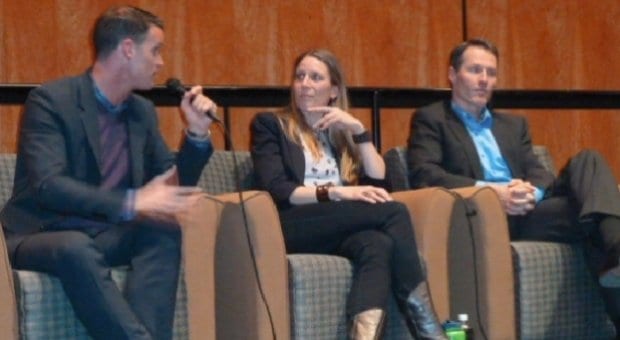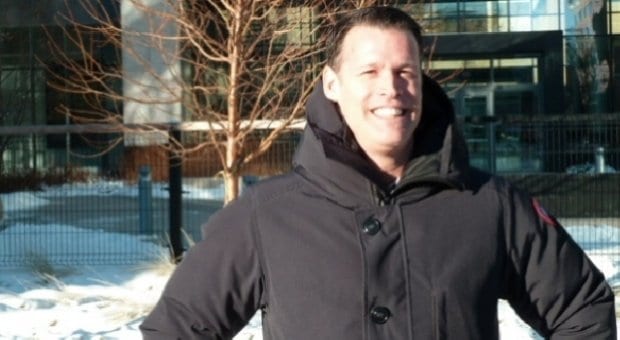
Former Olympian Mark Tewksbury (left) spoke on a panel entitled "Sochi Olympics: The Politics of Sport" at Calgary’s Mount Royal University, along with four-time Olympic speed-skating medallist Kristina Groves and David Legg, past president of the Canadian Paralympic Committee. Credit: Doug Boyce
“I’m very concerned about the Sochi Games,” declares Mark Tewksbury, gay Olympic gold medallist, author and speaker. “I certainly don’t feel the same way I did two weeks before Vancouver.”
Tewksbury was speaking to a standing-room-only crowd gathered at Calgary’s Mount Royal University (MRU) for a panel discussion called “Sochi Olympics: The Politics of Sport.”
Four-time Olympic speed-skating medallist Kristina Groves and David Legg, past president of the Canadian Paralympic Committee and assistant professor in MRU’s Department of Physical Education and Recreation Studies, were also on the panel.
“This Games is plagued with all kinds of challenges,” Tewksbury noted. “I [will] focus on the LGBT issue and gay rights in Russia, but sadly, the security issue seems to be coming back, and perhaps the corruption issue will even trump that.”
Xtra chatted with Tewksbury after the panel.
As a former competitive swimmer and Canada’s chef de mission at the 2012 Olympic Games in London, all Tewksbury cares about now is the performance of the Canadian team.
“These issues are really a distraction to what the team has been building towards for years and years and years.” For them, it’s a “culmination of a career,” he says.
Now is the “peak time” for gay rights issues to be raised, he says. “[If] the gay and lesbian community of Russia want to march, they’ve got every right to. Their human rights are being threatened.
“I fully expect that there will be some kind of protest, a very well-organized, spontaneous gathering of LGBT people, in the early Games, probably the day before, [or] the opening ceremonies, when the appetite is there.”
Tewksbury is glad that so much conversation is happening around LGBT rights and the Olympics. “John Baird has been very forceful in speaking out against the Russian government’s anti-gay legislation. The president of the United States came up with really a clever way to shame his hosts. Those things are real pluses.”
The American delegation to Sochi includes three out gay athletes: tennis legend Billie Jean King, ice hockey player Caitlin Cahow and former Olympic figure-skating gold medallist Brian Boitano.
“The LGBT community in Russia said, ‘Please let the Olympics come so it keeps the spotlight on this issue for us,’” Tewksbury explains. “So we’ll see what happens during the Games.”
He wonders how much people outside of Russia can do to “force change” to occur.
While he believes a lot is being done, it’s “not enough, but we’re doing as much as we can not being inside of Russia.”
“Unfortunately, the LGBT community in Russia is still going to be stuck with this horrendous situation, but success is happening. It’s a sliding scale of success because the ultimate change would be that none of this shit happens in the 76 countries where gays can be executed or imprisoned or discriminated against.”
Tewksbury recognizes that people outside Russia are outraged. “Although I don’t agree with how it was expressed against the athletes, it’s a valid emotion to have from awarding Games to a place that expressly discriminates,” he says. “Part of your athlete group doesn’t feel safe to compete there; how can you possibly enable that to happen?”
Referring to calls for a Games boycott, Tewksbury says he understands the emotion of ‘We’ve got to show our disgust at what’s going on,’ but he feels that a boycott is a mistake. “The protest should not be the responsibility of the athletes, but the governing body, the International Olympic Committee, that made the decision to go to Sochi. If anyone is to be held accountable, it should be at that level,” he contends.
“Most athletes feel showing up and competing is protest for them, and that’s fair. Every individual has the right to decide how they want to express themselves,” he adds.
Tewksbury admits that things get more complicated for gay or lesbian athletes. “If you’re open and brave and want to protest, you have every right to do that and have to find a way you’re comfortable with.”
He uses the example of Canadian speed skater Anastasia Bucsis, who recently came out. “Being an open lesbian, for her, is enough of a protest. She doesn’t want to go any further in Sochi.”
Other athletes who have not come out are very afraid, Tewksbury says. “Terrified young men, women going to a country where they are being expressly discriminated against. People with machine guns, X-ray machines and technology [are] going to log on to their technology when they’re there.”
Tewksbury is aware of an athlete who felt forced to reveal his sexuality to his family sooner than he was ready to because of the situation. “This athlete felt, ‘I’m going to need them there,’” he says, adding that the athlete’s greatest fear is that there will be a moment that might force him to be outspoken.
“When I was competing, I had the same closeted feelings and found somebody, my outlet, so I could channel energy to my race, and that was my breakthrough,” he says. “These [closeted] athletes have done that because they have spoken to me, or talked to the sports psychologist that’s led them to me.”
“They’re dealing with how people deal with difference in a league or group or team, but that external threat [of persecution] is really hard. Not only are you trying to hide it, and you’re not really having the support, because [you’re] not completely out, you have the threat outside on top of that.”
“Human rights has to become a measure by which the IOC decides on future cities that get the Olympic Games,” Tewksbury argues. “It has to be more than just economics, infrastructure, accommodation and security. I hope the IOC learns something from that particular sensitivity around Sochi.”

 Why you can trust Xtra
Why you can trust Xtra


